Hong Kong News

Hong Kong officials order Covid-19 lockdowns in three more areas
Health officials in Hong Kong have for the first time invoked a new, stricter rule to order all workers at an outlet of retail clothing giant Uniqlo to undergo Covid-19 testing after three employees were infected, with customers urged to get screened as well if they developed symptoms.
The government also locked down another three areas on Tuesday night, after conducting similar sudden operations at four sites a day earlier.
The latest lockdowns, which started at 7pm and are expected to last for about 12 hours, cover three zones in Sham Shui Po, Yau Ma Tei and Tin Shui Wai. People in the areas are required to undergo Covid-19 tests and stay at home until all screenings are completed.
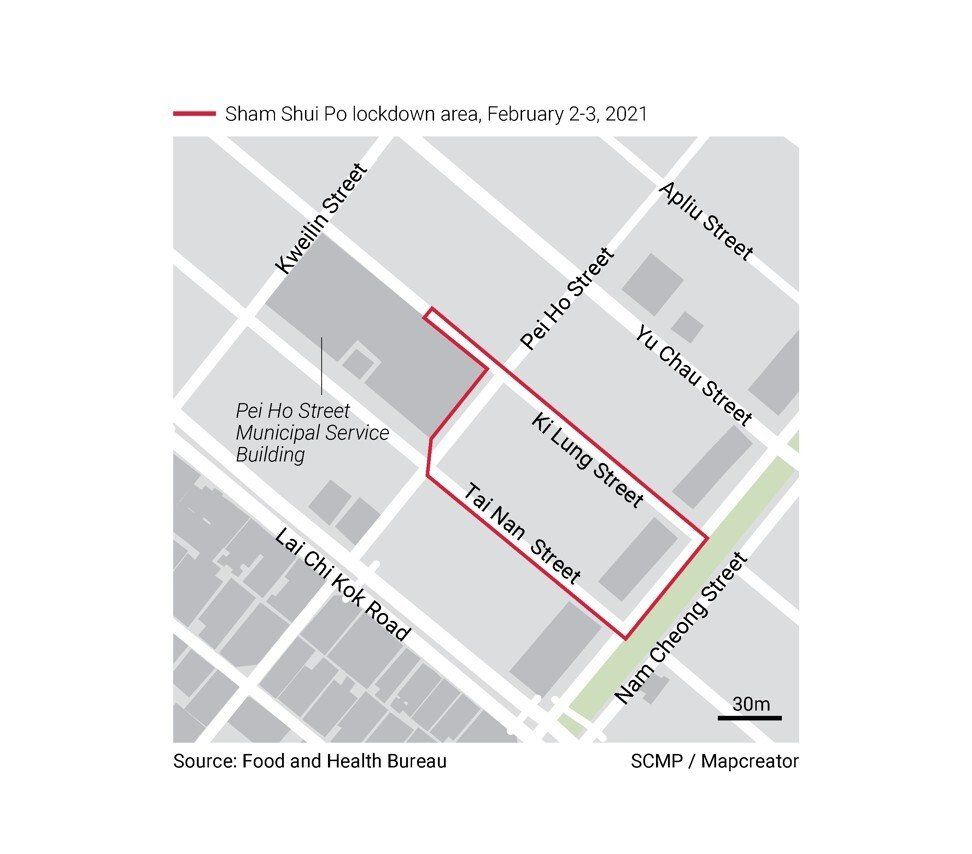
In Sham Shui Po, 17 blocks were covered within an area enclosed by 239-263 Ki Lung Street, 89 Nam Cheong Street, 256-280 Tai Nan Street and 60-74 Pei Ho Street.
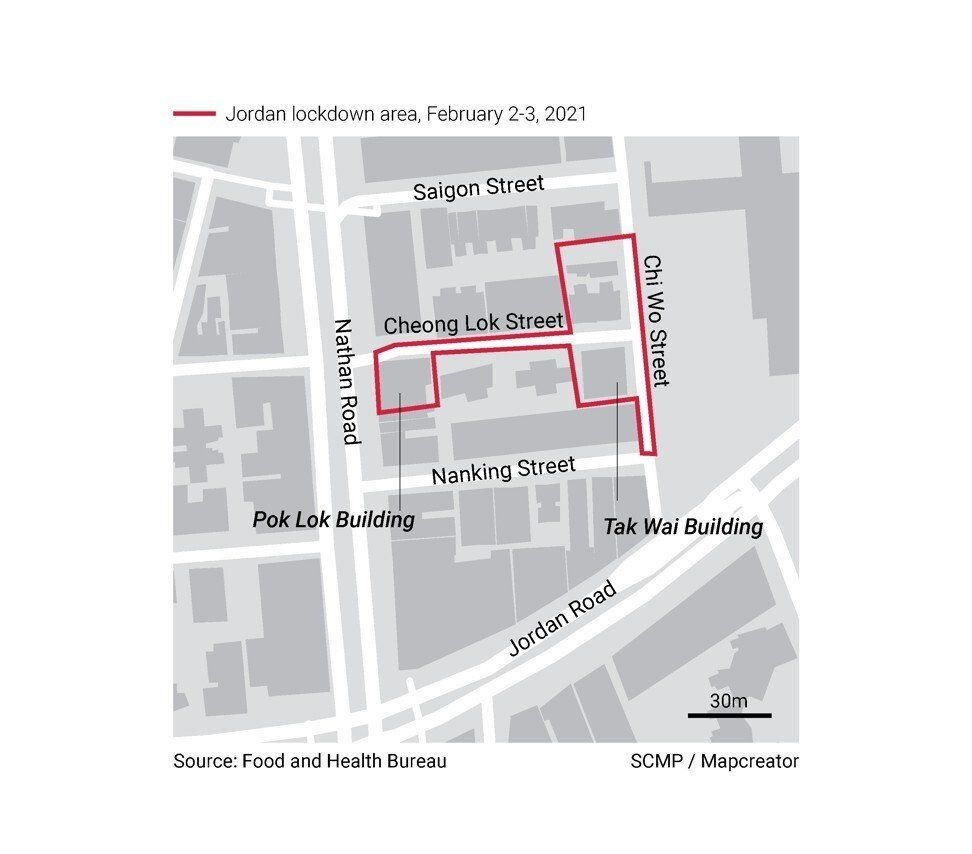
In Yau Ma Tei, several blocks covering 322-326A Nathan Road, 13 Chi Wo Street, and 23-27 and 22-28 Cheong Lok Street, including Pak Lok Building and Tak Wai Building, were cordoned off.
Heng Lok House in Tin Shui Wai’s Tin Heng Estate was also locked down.
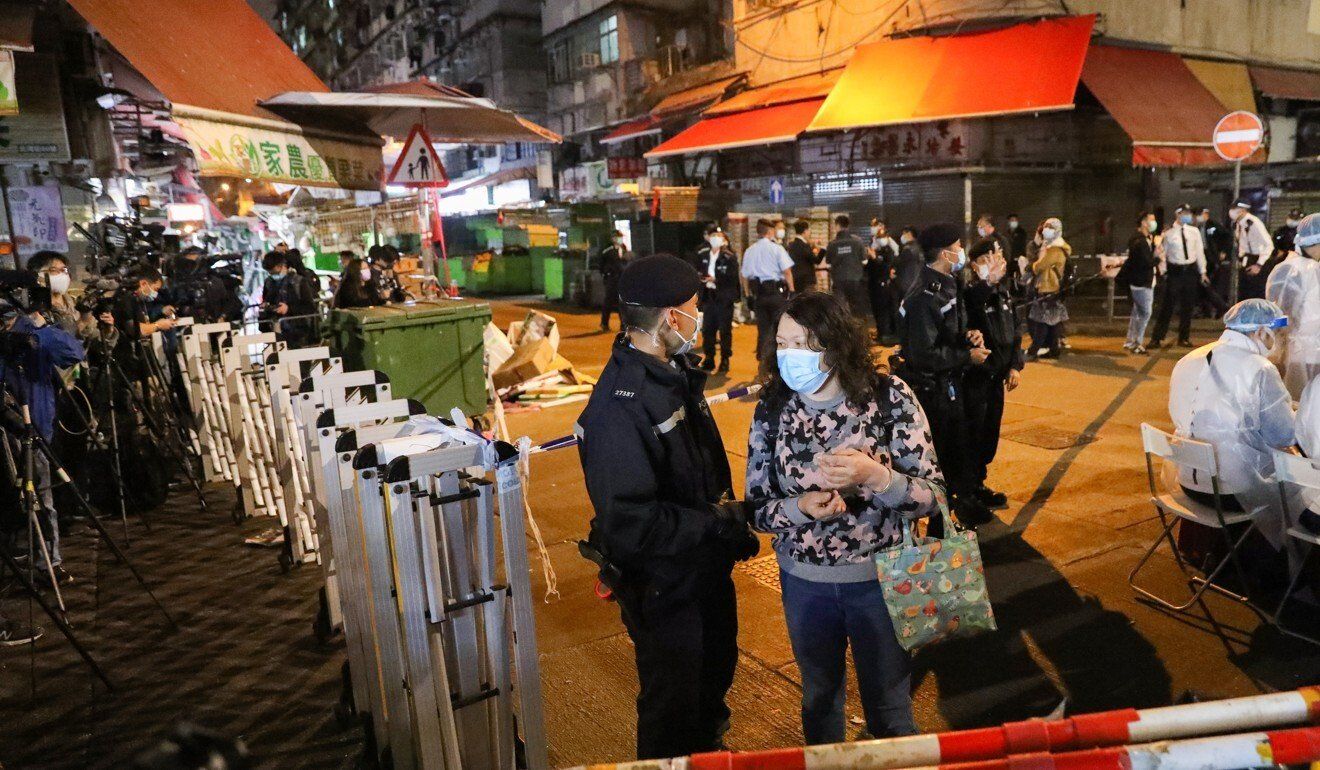 A mobile testing centre is set up on Ki Lung Street in Sham Shui Po.
A mobile testing centre is set up on Ki Lung Street in Sham Shui Po.
The city’s leader, Carrie Lam Cheng Yuet-ngor, arrived at the Sham Shui Po lockdown site at about 11pm, accompanied by health secretary Professor Sophia Chan Siu-chee, home affairs minister Caspar Tsui Ying-wai and police’s Kowloon West regional commander Rupert Dover.
Lam spent 15 minutes in the area for a briefing from health officials and to show support to residents queuing for a test.
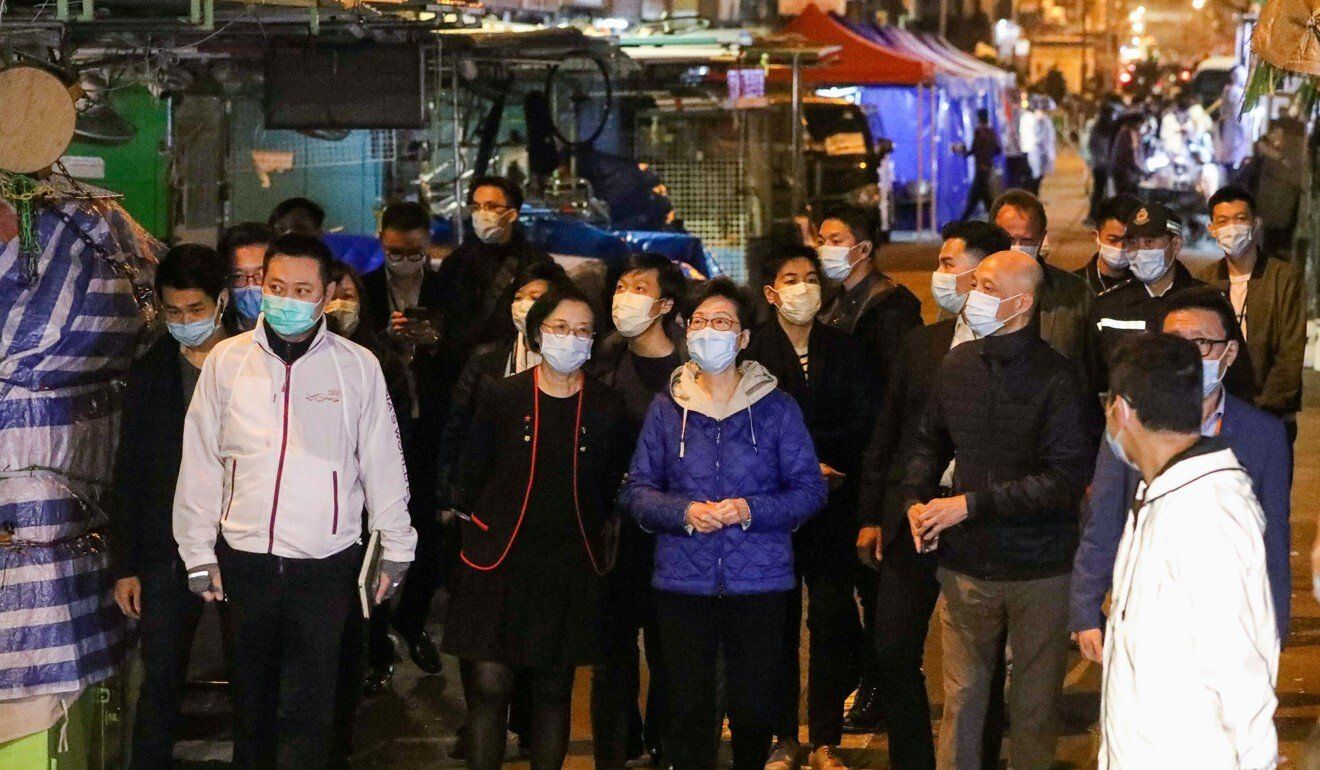 Chief Executive Carrie Lam (in purple) and health minister Sophia Chan at the Sham Shui Po lockdown zone.
Chief Executive Carrie Lam (in purple) and health minister Sophia Chan at the Sham Shui Po lockdown zone.
Among those caught up earlier in the Sham Shui Po operation was a man having his hair dyed at a salon.
The middle-aged man was seen walking around with cling wrap on his head and complaining he did not live inside the zone. He lined up for a Covid-19 test and was allowed to leave afterwards.
Asked about his hair, he replied: “I’ll just go home and wash it, there is nothing I can do.”
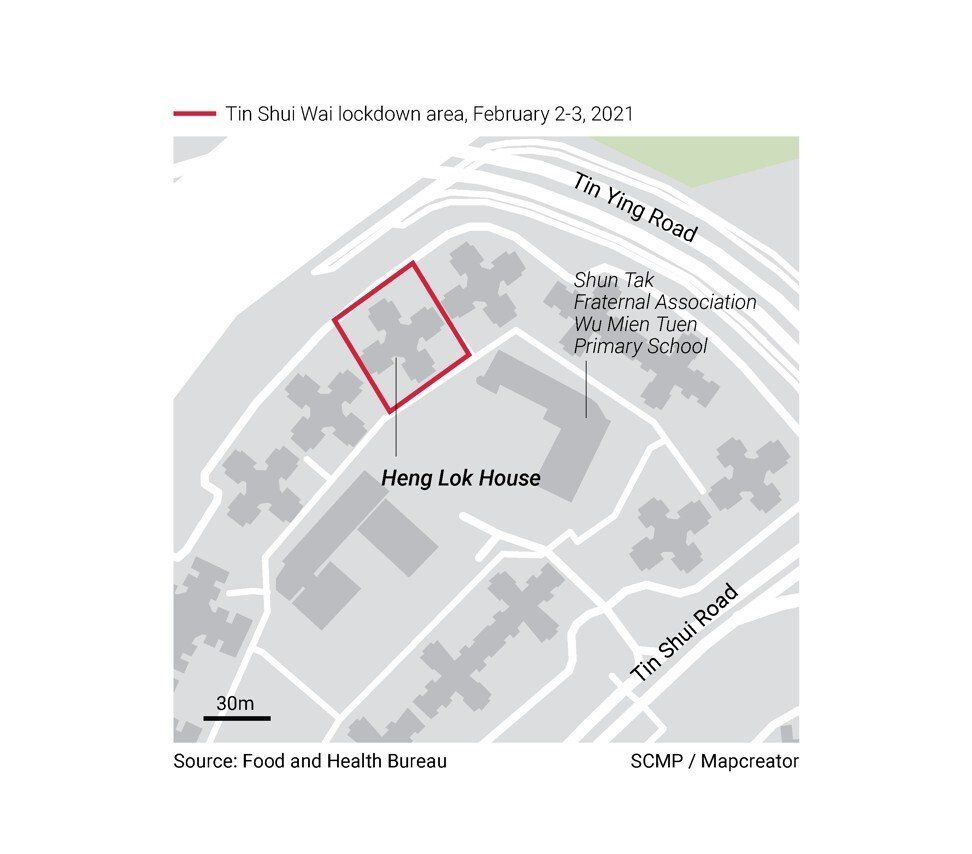
The government on Monday unveiled its toughest package of testing measures yet, lowering the threshold for compulsory screening in a residential building to just one untraceable infection and two of any kind for a workplace.
Dr Chuang Shuk-kwan, head of the Centre for Health Protection’s communicable disease branch, revealed on Tuesday that a Uniqlo store, on the fifth floor of Langham Place shopping centre in Mong Kok, became the first workplace to be put under such an order.
Some 20 full-time and 50 part-time workers who had visited the premises since January 14 will have to take a test, while the shop will be closed for 14 days. The compulsory notice, however, does not cover customers.
“Of course, the general public are welcome to get a test. But we have no evidence that the virus will spread to the crowds visiting the shop. But if they are worried and have symptoms, they should go for a test,” she said.
The move came as the city confirmed 25 new coronavirus cases, matching the previous low in the ongoing fourth wave of infections recorded on January 6, before the recent rebound.
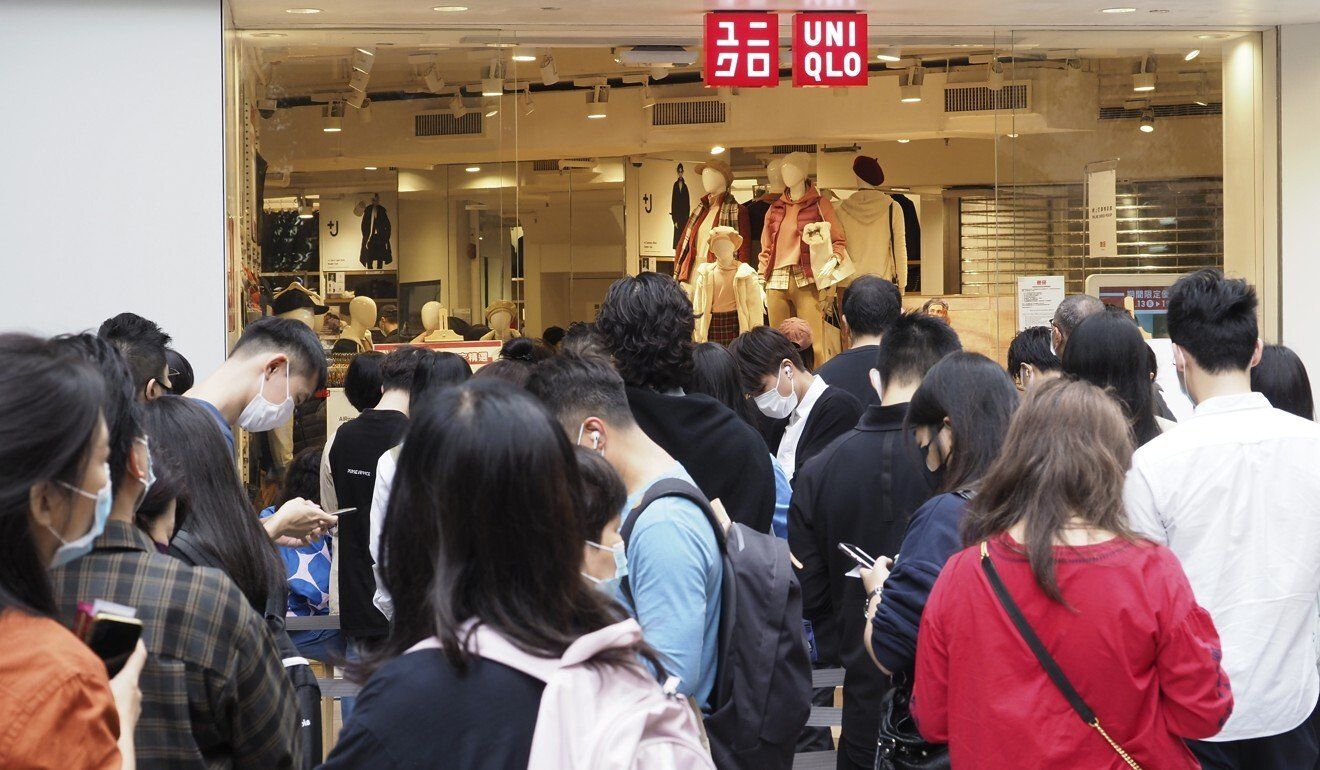 Uniqlo is the first company hit under the new rules for workplace infections.
Uniqlo is the first company hit under the new rules for workplace infections.
Untraceable infections were also on the wane, with just four recorded, the lowest since the start of the fourth wave on November 19, when two unlinked cases were reported.
One infection was imported, while more than 20 people tested preliminary-positive.
The city’s tally of confirmed infections stood at 10,511, while two elderly patients became the latest fatalities, raising the death toll to 184.
The action at Uniqlo was triggered after officials confirmed two more infections among workers there on Tuesday, on top of one earlier case.
Chuang said all three workers attended a private gathering on Hong Kong Island with eight other friends. Five infections and one preliminary-positive case have been linked to the gathering.
Further investigations were required to determine whether the party or the shop was the origin of the outbreak, Chuang said, adding an infected employee last went to work at the store on Saturday.
The four untraceable infections also triggered mandatory testing orders at various buildings including May Wah House on Hing Wah (I) Estate and Yau Oi Estate’s Oi Fai House.
The city’s airport remained a hotspot for concern, with five more cases linked to a construction site for the third runway project, taking the total number of infections in the cluster to 20.
Officials also revealed that five more travellers from a host of countries were found to be infected with new, fast-spreading strains first reported in Britain and South Africa, complicating the city’s efforts to fight the coronavirus.
Altogether, at least 26 such cases have been recorded in the city but Chuang said there was no evidence the strain had been spreading locally.
This came as the government announced close to 70,000 people employed at the airport, including those engaged by subcontractors, will have to take a one-off compulsory virus test between February 4 and 25, before they can work there in March.
The government’s enhanced testing drive at the city’s air border also included a voluntary, regular screening scheme for about 2,000 employees at higher risk of exposure to Covid-19, such as those responsible for handling quarantine procedures, cold chain logistics or cleaning aircraft cabins.
Another regular, voluntary scheme that covers all airport staff with a capacity of 800 tests per work day will also continue.
Meanwhile, other local clusters reported more cases on Tuesday. One more infected worker at the Salvation Army Nam Shan Residence for Senior Citizens in Sham Shui Po, in addition to another infected employee and a resident, prompted authorities to quarantine a total of 50 staff members and 70 residents on two floors of the facility.











